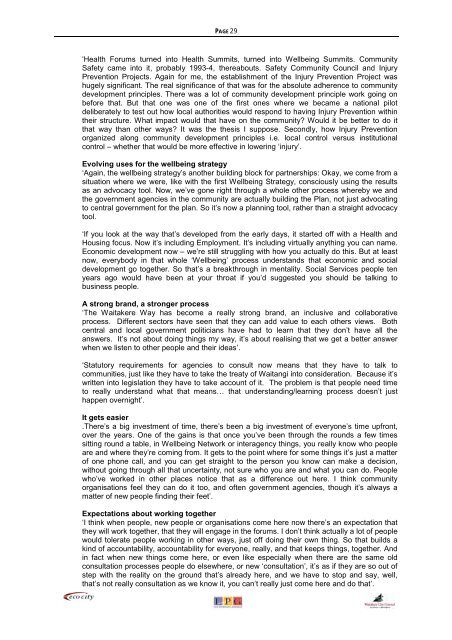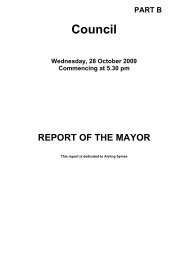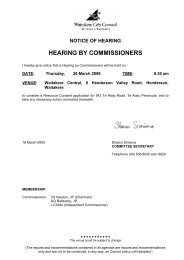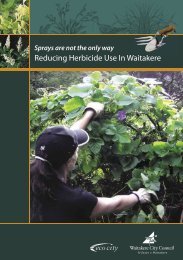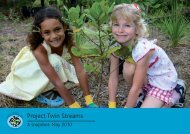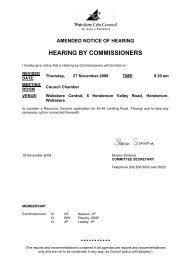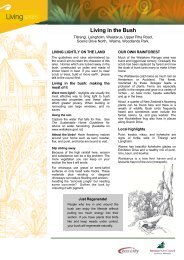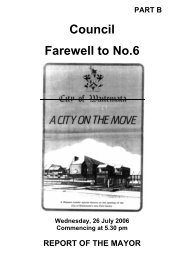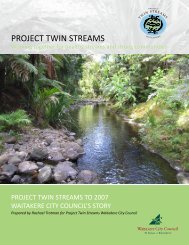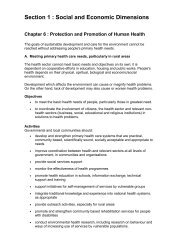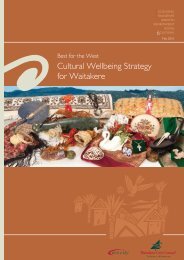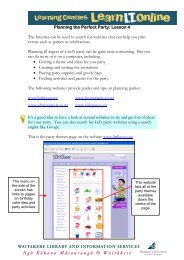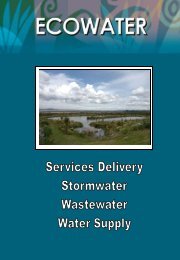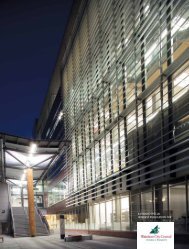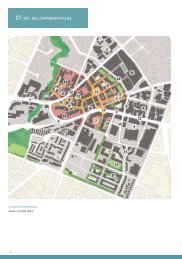The Waitakere Way - Looking Back, Going Forward - Auckland Council
The Waitakere Way - Looking Back, Going Forward - Auckland Council
The Waitakere Way - Looking Back, Going Forward - Auckland Council
Create successful ePaper yourself
Turn your PDF publications into a flip-book with our unique Google optimized e-Paper software.
PAGE 29‘Health Forums turned into Health Summits, turned into Wellbeing Summits. CommunitySafety came into it, probably 1993-4, thereabouts. Safety Community <strong>Council</strong> and InjuryPrevention Projects. Again for me, the establishment of the Injury Prevention Project washugely significant. <strong>The</strong> real significance of that was for the absolute adherence to communitydevelopment principles. <strong>The</strong>re was a lot of community development principle work going onbefore that. But that one was one of the first ones where we became a national pilotdeliberately to test out how local authorities would respond to having Injury Prevention withintheir structure. What impact would that have on the community? Would it be better to do itthat way than other ways? It was the thesis I suppose. Secondly, how Injury Preventionorganized along community development principles i.e. local control versus institutionalcontrol – whether that would be more effective in lowering ‘injury’.Evolving uses for the wellbeing strategy‘Again, the wellbeing strategy’s another building block for partnerships: Okay, we come from asituation where we were, like with the first Wellbeing Strategy, consciously using the resultsas an advocacy tool. Now, we’ve gone right through a whole other process whereby we andthe government agencies in the community are actually building the Plan, not just advocatingto central government for the plan. So it’s now a planning tool, rather than a straight advocacytool.‘If you look at the way that’s developed from the early days, it started off with a Health andHousing focus. Now it’s including Employment. It’s including virtually anything you can name.Economic development now – we’re still struggling with how you actually do this. But at leastnow, everybody in that whole ‘Wellbeing’ process understands that economic and socialdevelopment go together. So that’s a breakthrough in mentality. Social Services people tenyears ago would have been at your throat if you’d suggested you should be talking tobusiness people.A strong brand, a stronger process‘<strong>The</strong> <strong>Waitakere</strong> <strong>Way</strong> has become a really strong brand, an inclusive and collaborativeprocess. Different sectors have seen that they can add value to each others views. Bothcentral and local government politicians have had to learn that they don’t have all theanswers. It’s not about doing things my way, it’s about realising that we get a better answerwhen we listen to other people and their ideas’.‘Statutory requirements for agencies to consult now means that they have to talk tocommunities, just like they have to take the treaty of Waitangi into consideration. Because it’swritten into legislation they have to take account of it. <strong>The</strong> problem is that people need timeto really understand what that means… that understanding/learning process doesn’t justhappen overnight’.It gets easier.<strong>The</strong>re’s a big investment of time, there’s been a big investment of everyone’s time upfront,over the years. One of the gains is that once you’ve been through the rounds a few timessitting round a table, in Wellbeing Network or interagency things, you really know who peopleare and where they’re coming from. It gets to the point where for some things it’s just a matterof one phone call, and you can get straight to the person you know can make a decision,without going through all that uncertainty, not sure who you are and what you can do. Peoplewho’ve worked in other places notice that as a difference out here. I think communityorganisations feel they can do it too, and often government agencies, though it’s always amatter of new people finding their feet’.Expectations about working together‘I think when people, new people or organisations come here now there’s an expectation thatthey will work together, that they will engage in the forums. I don’t think actually a lot of peoplewould tolerate people working in other ways, just off doing their own thing. So that builds akind of accountability, accountability for everyone, really, and that keeps things, together. Andin fact when new things come here, or even like especially when there are the same oldconsultation processes people do elsewhere, or new ‘consultation’, it’s as if they are so out ofstep with the reality on the ground that’s already here, and we have to stop and say, well,that’s not really consultation as we know it, you can’t really just come here and do that’.


